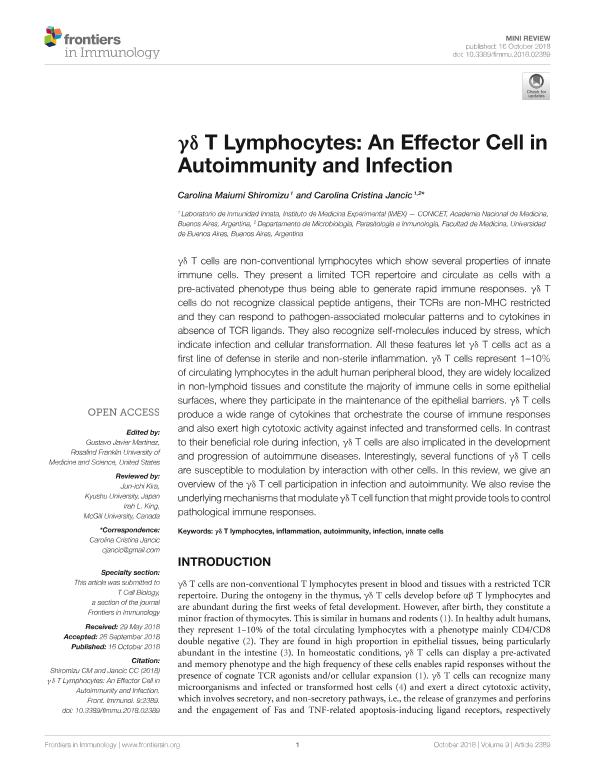Artículo
γδ T lymphocytes: An effector cell in autoimmunity and infection
Fecha de publicación:
10/2018
Editorial:
Frontiers Media SA
Revista:
Frontiers in Immunology
ISSN:
1664-3224
Idioma:
Inglés
Tipo de recurso:
Artículo publicado
Clasificación temática:
Resumen
γδ T cells are non-conventional lymphocytes which show several properties of innate immune cells. They present a limited TCR repertoire and circulate as cells with a pre-activated phenotype thus being able to generate rapid immune responses. γδ T cells do not recognize classical peptide antigens, their TCRs are non-MHC restricted and they can respond to pathogen-associated molecular patterns and to cytokines in absence of TCR ligands. They also recognize self-molecules induced by stress, which indicate infection and cellular transformation. All these features let γδ T cells act as a first line of defense in sterile and non-sterile inflammation. γδ T cells represent 1-10% of circulating lymphocytes in the adult human peripheral blood, they are widely localized in non-lymphoid tissues and constitute the majority of immune cells in some epithelial surfaces, where they participate in the maintenance of the epithelial barriers. γδ T cells produce a wide range of cytokines that orchestrate the course of immune responses and also exert high cytotoxic activity against infected and transformed cells. In contrast to their beneficial role during infection, γδ T cells are also implicated in the development and progression of autoimmune diseases. Interestingly, several functions of γδ T cells are susceptible to modulation by interaction with other cells. In this review, we give an overview of the γδ T cell participation in infection and autoimmunity. We also revise the underlying mechanisms that modulate γδ T cell function that might provide tools to control pathological immune responses.
Palabras clave:
AUTOIMMUNITY
,
INFECTION
,
INFLAMMATION
,
INNATE CELLS
,
γδ T LYMPHOCYTES
Archivos asociados
Licencia
Identificadores
Colecciones
Articulos(IMEX)
Articulos de INST.DE MEDICINA EXPERIMENTAL
Articulos de INST.DE MEDICINA EXPERIMENTAL
Citación
Shiromizu, Carolina Maiumi; Jancic, Carolina Cristina; γδ T lymphocytes: An effector cell in autoimmunity and infection; Frontiers Media SA; Frontiers in Immunology; 9; 10-2018; 1-8
Compartir
Altmétricas




